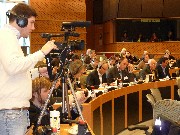EP public hearing warns of serious concerns with postal liberalisation

The Confederal Group of the European United Left - Nordic Green Left (GUE/NGL) in the European Parliament organised together with UNI europa a public hearing in the European Parliament on the social consequences of liberalisation in the postal market. More than 70 persons accepted the invitation and met in the European Parliament. Joe Higgins and Dennis de Jong, both Members of the European Parliament from the GUE/NGL group, in their introductions, made very clear which were the main driving forces for this liberalisation. In 2007 the postal sector was worth 94 billion Euro and big multinational companies wanted a piece from the cake. The people who are suffering from this process are the citizens, small customers, small businesses and the workers.
Neil Anderson, head of department from UNI Post & Logistics, thanked the MEPs for making sure this was a first opportunity for representatives of postal workers to get to talk talk in the EU Parliament about the social consequences for postal workers and for this message to be heard by MEPs. He highlighted that the European Commission hasn't yet invested anything in researching the social consequences, so there are no official figures available. He said that the DG Market had sent mixed messages about how the Universal Service Obligation will be dealt with. Several different ideas from FG Markets which were unacceptable, such as differential pricing and government subsidies for the USO will not work to maintain a quality Universal Postal Service. Only 9 months are left until the full market opening and a number of national governments haven't prepared their legislation and regulation sufficiently to protect the social conditions in the sector. Neil Anderson emphasised: “Our experiences show very clearly, liberalisation means social dumping. We need more time to prepare for this new situation in the sector. Therefore UNI Post & Logistics calls for a moratorium to postpone the deadline for the full liberalisation until the open points are resolved.”
During the gearing there were reports from about 15 different countries in Europe and these showed very clearly that the fears and warnings from Trade Union’s side are well founded. In all countries, job cuts in the sector are taking place. The working conditions and also the quality of services are decreasing. Only a few countries found a solution to protect conditions and salaries in the sector including the new competitors. In the whole of Europe, the new competitors pay about 25% less in salaries and use mainly temporary contracts and part-time workers or simple outsource parts of the work. The financial crisis had now also raised serious concerns that the pace and purpose of this development needed to have serious reconsideration. The workers representatives had a common view that a moratorium would be an appropriate measure to prepare and protect the sector. The Unions all said they need the Parliament to insist that the Commission take urgent measures to investigate the social consequences of postal liberalisation and to look for proper solutions to suggest to the member states to protect the people’s interests.
Sabine Wils, MEP from the GUE/NGL group summing up the debate, thanked the participants for the information and experiences passed over to the European Parliament during the hearing. She said it was clear that postal liberalisation very means social dumping and cherry picking in the sector. Workers and citizens will suffer the most from this development. It is also the mission of the European Parliament and the European Commission to ensure that the interests of all affected groups are met. The MEPs shall support the demands of citizens and workers and demand of the Commission that they take actions to ensure a fair and social compatible policy on European level. The GUE/NGL group wants to improve the cooperation with the Unions and create a better communication to support their demands.

